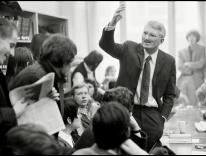Xan Cassavetes 2004 documentary Z Channel: A Magnificent Obsession (available DVD-only from Netflix) chronicles the history of the Los Angeles-area pay-TV station that specialized in cinema and gave viewers an art-house experience without having to leave the couch. That these viewers included Quentin Tarantino and other future luminaries is emphasized: Predating HBO and Cinemax, Z ran from 1974 to 1989 and influenced a generation of young artists yearning to make it big in the local industry.It did so mainly with fare unlikely to find a way into the multiplex, from the uncut versions of Ciminos Heavens Gate and Bertoluccis 1900 to Altmans McCabe & Mrs. Miller and Peckinpahs gory westerns. There were John Ford tributes, Hitchcock marathons, Fellini and French New Wave festivals, and a lot more. The man responsible for the eclectic selection was programming director Jerry Harvey, and its his (and every fanatics) relationship with film that informs the title of the documentary. Friends and former colleagues recount Harveys fixation via anecdotes, and a humorously told story about his subjecting a girlfriend to three straight days of memorized line readings from Kubricks Dr. Strangelove hints at his capacity for emotional and physical cruelty, while also foreshadowing his end. The documentary makes passing reference to Harveys fundamentalist Catholic father in attempting to trace his demons, while noting that both of Harveys sisters killed themselves, but it doesnt follow the thread much farther than that.Cassavetes spends more time on the films, those that Harvey unearthed, championed, and insisted on showing the way their directors would have wanted. With each viewing of Z Channel I come away with another list of movies its time to see (or see again); just watch the final montage from the documentary to understand why.But its the commentary of critic F.X. Feeney that got more of my attention this time around. A Harvey confidante and a co-producer of the documentary, Feeney provides emotional first-hand recollections of working and watching movies with Harvey, and his energy buoys the film while steering it clear of hagiographic shoalsa necessary thing, given Harveys final act as the perpetrator of a murder-suicide at the age of 39 (with a gun presented as a gift from Peckinpah). While theres no way to overlook Harveys dark side, Feeney helps keep the focus on his creative impulse and the art he brought to light.
